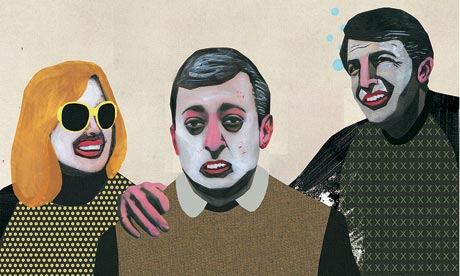
To see the future of the "happiness industry", head to California: if there's a way to charge money for a service that promises to make life better, some Californian will have figured it out. In certain jails there, nonviolent offenders can pay around $100 a day for an upgrade to a nicer cell, further from violent inmates, and sometimes with the right to use a laptop. Californian life-coaches abound, obviously, while new agers congregate at the world-famous Esalen centre, in Big Sur, to study craniosacral therapy and shamanism. And, as the (California-based) sociologist Arlie Hochschild discovered, in California you can consult a "wantologist" who, for a fee, will help discover what the Want-ology™ self-help system refers to as your "soul wants". Increasingly, Hochschild argues, we are "outsourcing intimate parts of our lives". If you want to – in the US, anyhow – you can now rent a friend, rent a grandma, or pay someone to visit a deceased relative's grave.
California's key contribution to happiness, of course, is to let the rest of us laugh and feel superior; we'd never fall for such nonsense, we tell ourselves, even if we could afford it. But Hochschild's new book, The Outsourced Self, suggests we should not be so smug. We may personally spurn decluttering consultants and wedding planners, but we absorb "the cultural belief in the superiority of what's for sale", assuming the professional version must be best. (In an essay based on the book, Hochschild noted the rise of the phrase "dating in the wild" to mean dating without dating services – or what we used to call "dating".) Even less outre paid services, such as childcare or cleaning or therapy, get us trapped in a cycle: we work harder to pay for them, so have still less time to forge the family and community bonds on which earlier generations might have relied for such support.
The more insidious peril here is the one identified by the political philosopher Michael Sandel: even when the price is fair, there are some things – friendship and graveside visits would seem strong candidates – for which there shouldn't be a price at all. Markets have what Sandel calls a "corrosive tendency", turning life's most important ends into instruments of profit and exchange. Perhaps it's that, not the threat to privacy, that bothers some people so much about Facebook: when social life and advertising are so completely blended, friendship itself suffers. And maybe the special, soul-eroding awfulness of flying with Ryanair lies not in the hidden fees, but in the sense that there are certain services – a glass of water, say, or access to a toilet, for which the airline once threatened to charge – that humans should provide for each other not as market transactions, but because they're humans.
Oddly, when I called Kevin Kreitman, creator of Want-ology™, she basically agreed. She'd developed the approach, she explained, to help people reconnect with what they really wanted – not what the market, among other forces, told them to want. "What alienates us from ourselves is having these longings, then trying to fill them with more money," she said, on the phone from (where else?) California. Her position on paid-for happiness services was one of compromise. If you can afford a cleaner, "that's great, so long as it doesn't lead you to feel your house has to be pristine at all times. And if I ever have to hire somebody to pet my cat, we're leaving town."
oliver.burkeman@theguardian.com; twitter.com/oliverburkeman

